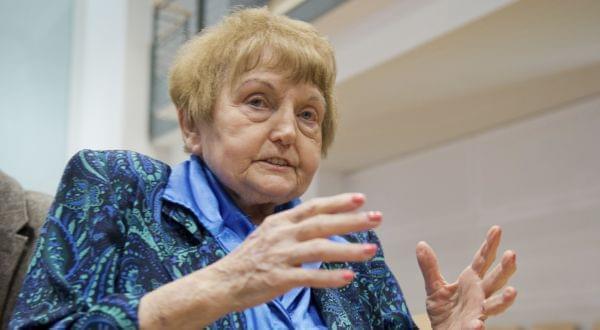Terre Haute Resident & Holocaust Survivor Eva Kor, Dies At Age 85

Auschwitz survivor Eva Kor, who championed forgiveness even for those who carried out the Holocaust atrocities, during a courtroom appearance in Germany in 2015. Julian Stratenschulte/Pool Photo via AP
Holocaust survivor Eva Mozes Kor, who championed forgiveness even for those who carried out the Holocaust atrocities, died Thursday during an overseas trip for a museum she founded in Terre Haute, Indiana, her son said.
Kor was in Krakow, Poland, for an annual educational trip with the CANDLES Holocaust Museum and Education Center in Terre Haute, and died in the morning in her hotel room. While her health had recently improved, Kor had a tough year medically with a heart surgery and respiratory issues, said her son Alex Kor, who was with her when she died.
"My mom would be mad at me for crying," he said in a phone interview from Poland. "She would also tell other people not to cry to try and follow in her footsteps to try to make all wrongs right and make the world a better place. That's her legacy. That's her gift."
Eva Kor was a Jewish native of Romania who was sent in 1944 to the Auschwitz concentration camp in Nazi-occupied Poland, where most of her family was killed. She and her twin sister survived, but they were subjected to inhumane medical experiments, conducted by the physician and SS officer Josef Mengele.
She later moved to Terre Haute, Indiana, where she lived for over three decades. She married a fellow Holocaust survivor, raised a family and worked in real estate.
In a 2017 interview with Niala Boodhoo for “The 21st”, Kor said she did her best to put memories of her time at Auschwitz behind her, until 1978, when the TV miniseries “Holocaust” aired on NBC. The program brought new attention to the history of the Holocaust in the U-S, and Kor began to speak publicly about her experiences, and also seek out other survivors of Auschwitz.
In 1985, she founded CANDLES, or Children of Auschwitz Nazi Deadly Lab Experiments Survivors. Through the organization, Kor located 122 other survivors of Mengele’s experiments on twins. The CANDLES Holocaust Museum and Education Center opened in 1995.
It was during the making of a documentary about Auschwitz that Eva Kor says she discovered the importance of forgiveness in dealing with her persecutors. After meeting Dr. Hans Munch, a now-remorseful physician who signed death certificates for the victims at the concentration camp, Kor said she wanted to thank him for his kindness by writing him a letter of forgiveness. In the process of working on the letter, one of her old college professors told Kor that her real problem was with her own tormentor, Joseph Mengele, who died, apparently unrepentant, in Brazil in 1979.
Kor said her decision to eventually personally forgive Mengele for what he had done to her was a way of healing wound that had left her broken in “heart, soul and spirit”.
“Once I could forgive, I felt whole inside,” said Kor. “I was no longer broken. People say to me, how can you forgive the Nazis? And I usually answer it with a question, do I deserve to be free from what they have done to me? And the answer is, of course, yes. But that’s what I was doing by forgiveness. I was restoring that broken spirit to make it whole again. And each person has to do it for himself or herself. Nobody can do it for me, and I cannot do it for anybody else.”
Kor's sister Miriam Zeiger died in 1993 of cancer.
Kor often gave lectures, wrote an autobiography and appeared in documentaries, sharing her story and message of forgiveness. She appeared in many documentary films, including the 2006 feature, “Forgiving Dr. Mengele”, which focused on the forgiveness theme. During the annual trips to Poland, she would give tours of Auschwitz.
"The themes of Eva's life are apparent. We can overcome hardship and tragedy. Forgiveness can help us to heal," a museum statement said. "And everyone has the power and responsibility to make this world a better place."
Eva Kor’s teachings on forgiveness were controversial with many people, notably many Holocaust survivors, who believed they minimized the culpability of the Nazis. Kor argued that forgiveness did not mean forgetting, and should be part of both remembering the crimes of the past, and preventing future ones.
“Forgiveness is the only way that people will heal themselves and still remember and stand up with good ideas to try to stop it, as they see it happening,” said Kor. “Not by the time it gets as big as ISIS or Hitler got before that.”
In 2017, Kor was named as a recipient of the Sachem Award, which is Indiana's highest honor.
Indiana Gov. Eric Holcomb said the "world lost a giant."
"Everywhere she went, Eva brought light into darkness and provided comfort to those in pain unlike anyone we've ever met," he said in a statement.
CANDLES Holocaust Museum officials said the center in Terre Haute will be closed until Tuesday in honor of Kor's memory.
A public memorial service is planned. Museum officials said details would be released at a future date.
Kor is survived by her husband and two children. Her twin sister, Miriam Zeiger, died in 1993 of cancer.

